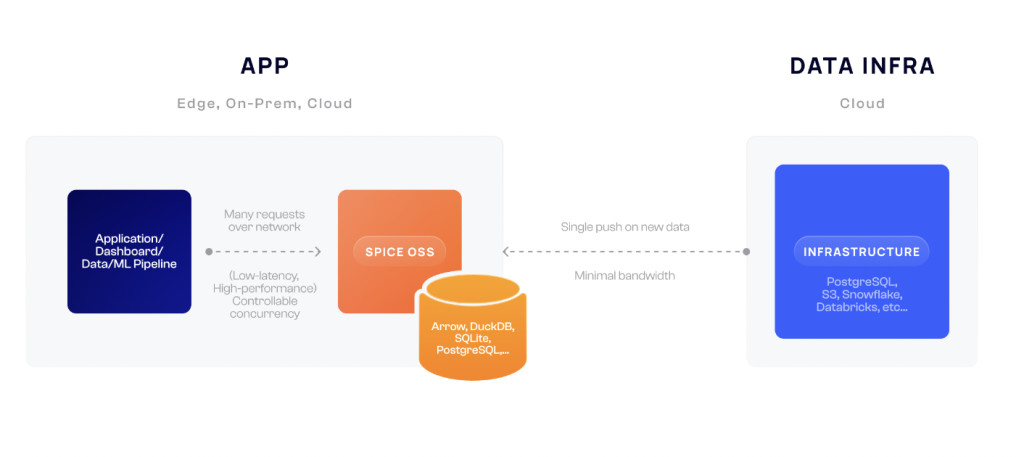The demand for speed and efficiency is ever-increasing in the rapidly evolving landscape of cloud applications. Cloud-hosted applications often rely on various data sources, including knowledge bases stored in S3, structured data in SQL databases, and embeddings in vector stores. When a client interacts with such applications, data must be fetched from these diverse sources over the network. These traditional methods introduce several issues:
High Latency: Network delays can significantly slow data retrieval.
Cost: Frequent data access can escalate Bandwidth and egress costs.
Concurrency: Managing concurrent data access can be complex and problematic.
Current solutions typically involve optimizing the network infrastructure or using caching mechanisms to improve data access times. While these approaches can mitigate some issues, they often fail to provide a comprehensive solution that integrates seamlessly with application logic and scales efficiently.
Meet Spice.ai: a novel solution that brings data closer to the application. Instead of the traditional model of querying remote data sources, Spice.ai materializes and co-locates data with the application. This approach eliminates the problems of high latency, cost, and concurrency.
Spice.ai is an open-source project that provides a portable runtime for developers. It offers a unified SQL interface to materialize, accelerate, and query data from any database, data warehouse, or data lake. The Spice runtime is built with industry-leading technologies such as Apache DataFusion, Apache Arrow, Apache Arrow Flight, SQLite, and DuckDB, ensuring robust performance and flexibility.
Spice.ai functions as an application-specific, tier-optimized Database CDN. It connects, fuses, and delivers data to applications, machine-learning models, and AI backends.
By materializing a working set of data locally, Spice.ai ensures low-latency access and high concurrency, making it ideal for various use cases:
1. Faster Applications and Frontends: Accelerate datasets for applications and frontends, resulting in quicker page loads and data updates.
2. Enhanced Dashboards and BI: Provide more responsive dashboards without incurring massive compute costs.
3. Optimized Data Pipelines and Machine Learning: Co-locating datasets in pipelines minimizes data movement and improves query performance.
4. Federated SQL Queries: Enable SQL queries across multiple databases, data warehouses, and data lakes using Data Connectors.
Spice.ai currently supports a variety of data connectors and stores, including Databricks, PostgreSQL, S3, Dremio, MySQL, DuckDB, Clickhouse, and more. It also supports local materialization and acceleration using In-Memory Arrow Records, Embedded DuckDB, SQLite, and attached PostgreSQL.
Spice.ai is not a cache, although it operates in a similar manner by prefetching and materializing filtered data proactively instead of fetching it upon a cache miss. Essentially, Spice.ai can be considered a CDN for databases. It brings data closer to where it is most frequently accessed, effectively reducing latency and improving performance for various data sources. This innovative approach ensures that applications have quick and efficient access to the necessary data, enhancing overall system responsiveness and reliability.
In conclusion, Spice.ai represents a significant leap in data management for cloud applications, offering a faster, more efficient way to handle data retrieval and processing. By bringing the data closer to the application, Spice.ai improves performance, reduces costs, and simplifies concurrency management, making it a compelling solution for modern developers.
The post Meet SpiceAI: A Portable Runtime Offering Developers a Unified SQL Interface to Materialize, Accelerate, and Query Data from any Database, Data Warehouse, or Data Lake appeared first on MarkTechPost.
Source: Read MoreÂ


